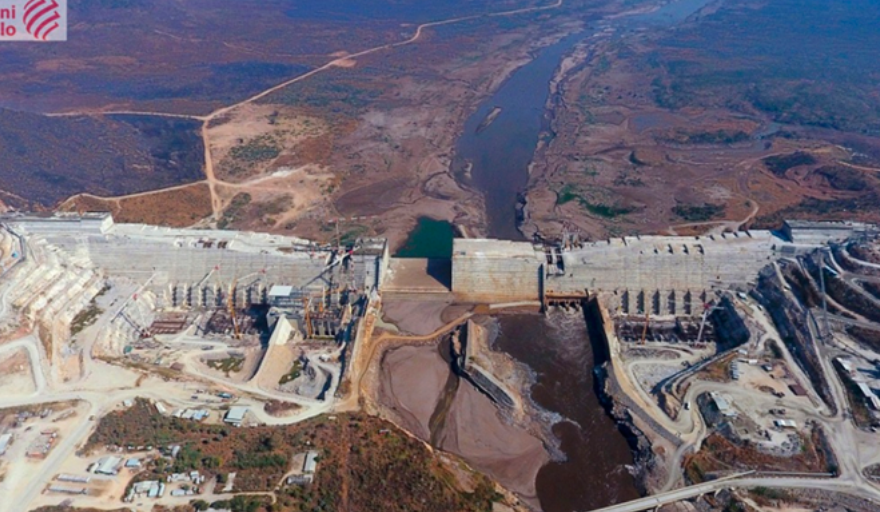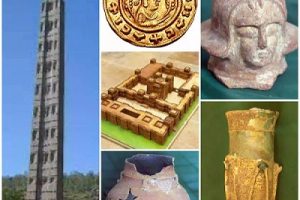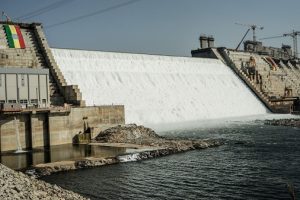
BY DIRRIBA TESHOME
The Grand Ethiopian Renaissance Dam (GERD) is unique for its state of the art architectural quality and strength. So far the construction has progressed for more than 70 per cent. It has also accomplished the first round filling of water last summer as the country is now bracing for the second round filling.
Sudan and Egypt lack no knowledge of the scientific and non-negotiable facts about the technical standards upon which the Grand Ethiopian Renaissance Dam (GERD) is being constructed. Ethiopia strictly adheres to legal and technical standards in the construction of GERD not only because it is obliged to abide by normative international laws and principles on utilization of Transboundary Rivers but is also a guarantee for ensuring optimum utilization of hydroelectric power from the dam.
This implies that both Egypt and Sudan need to look at the big picture surrounding the dam. Ethiopia shall never refrain from believing and acting on the utilization of the Blue Nile most equitably and rationally. The Ethiopian government and its negotiating team have repeatedly stressed that filling GERD is not a new undertaking outside the realms of the technical construction of the dam. There would not have been any point in starting the construction of a dam that would remain empty.
On the other hand, Sudan’s Water Resources Minister Yasser Abas said Sudan’s position on the Grand Ethiopian Renaissance Dam (GERD) has never changed from the beginning in his recent interview with Al Jazeera English. This was not so as Sudan was repeatedly swinging between remaining in the negotiations and at time boycotting it. “Sudan’s position has never changed from the beginning we support the dam.”
Undeniably Ethiopia admits such an official credit of the country’s right to build hydropower dams for hydropower generation.
Similarly, the former Sudan Irrigation and Water Resources Minister Osman Atum told Sky News Arabia that the second phase filling of the GERD poses no impact on the water resource of Sudan than the presumed threats of GERD on Egypt and Sudan are mostly erroneous.
“The water resources endowment of our country is our God-given natural blessing. It is up to us all Ethiopians to develop it and use it judiciously in quenching our thirst, protect our health, produce enough food and energy, and manage the resource to overcome the horrific consequences of droughts and floods.” Dr Eng. Sileshi Bekele Minister of the Ministry Of Water, Irrigation and Energy said in his assignment acceptance speech.
He further pronounced that the focus of developing energy that could be harnessed from renewable resources of water, solar, wind and geothermal energy is attaining rewarding gains. “The present rapid generation capability we are witnessing with the likes of Grand Ethiopian Renaissance Dam, Ghibe Dams and wind farms show tremendous success. The completed and ongoing constructions for power generation success need to be complemented with the necessary capabilities in transmission, distribution and efficient use.”
Rapid growth and transformational development require reliable energy production, supply and efficiency. Without adequate and reliable quantity and quality of supply of energy, no industrialization, agricultural value additions, job creation, economic and sustainable growth are achievable.
Therefore, Ethiopia is exerting all the possible efforts in the water management system that needs to be supported by modern climate and water information system to establish robust weather and disaster prediction systems to achieve sustained growth. Such systems are essential to make an informed decision, manage the resource efficiently, maintain equity and justice, and reduce conflicts in boundary and transboundary waters.
“We should strengthen our resolve and capability to protect and uphold the interest of Ethiopia through negotiation and managing the transboundary resources that are getting complex from time to time;” the minister notes.
He added that even the third phase filling of the dam has no harm or negative impact on the lower riparian countries. The dam’s benefit to the downstream countries incomparably exceeds compared to the expected harm.
Had the individuals from Sudan and Egypt talking about the dam on media outlets been experts, they could have provided accurate information. There was above average water flow and flood over the last five years, Atum stated, adding that about 24 billion cubic meters of water had been accumulated in the Aswan High Dam last year alone.
Moreover, he alleged that Ethiopia’s plan to fill the dam with 13.5 and 10.5 billion cubic meter water in the 2nd and 3rd phase respectively will not impact Sudan’s water share. Egypt has repeatedly stated that it will not accept Ethiopia’s filling of the dam without a binding agreement in anticipation that it will reduce its share of the water supply.
The dam through a sustained annual flow of 48 billion cubic meters will have paramount importance whenever there is drought in Sudan and Egypt. The dam will be able to generate 48 billion cubic meters of water flowing to the downstream countries of Sudan and Egypt, he verified its importance.
Having the same view with Atum, Minister Yasir pointed out: “Now, the issue is that all these positive impacts can change automatically to very high risk if there is no agreement. So, our point is the same, we are supporting Ethiopia, but on the condition to reach agreement on filling and operation.”
As Ethiopia’s Minister of Water, Irrigation and Energy has repeatedly confirmed, Ethiopia has no problem in reaching a negotiated agreement and does not accept a one-sided and binding agreement that does not correspond with the reality on the ground. And it is not interested in politicizing and over politicizing Ethiopia’s efforts to provide electric power to its citizens.
Ethiopia firmly believes in the capability of Africans to solve their problems by themselves through the African Union (AU) led the negotiation and the second filling of GERD will go ahead as scheduled during the country’s rainy season.
Besides, Ethiopia has repeatedly noted that it would accept the role of the quartet mediation as long as they remain on observer status while AU as a leading regional African organization will remain the custodian of amicable negotiations among the three countries.
Nonetheless, the Foreign Ministers of Ethiopia, Sudan and Egypt held talks on GERD in Kinshasa recently but failed to reach an agreement and negotiations were concluded without an agreement.
Ethiopia wants the negotiations to continue under the backings of Africa as every African problem has African solutions, while Egypt and Sudan are calling for the quartet of negotiations to include other parties.
In contrary to the assertions of Sudan’s Water Resources Minister, uncertainties on the most important points of the negotiations, combining a wave of misinformation with sabre-rattling blended with a propaganda war, Egypt and Sudan have done a greater disservice to the continuation of negotiations under the leadership of the AU.
As “The Standard” has recently written: Sudan and Egypt must stop beating drums of war over Nile Dam Project: GERD and decide negotiation on equal and equitable rights to use the common natural resources.
In the same way, as in the words of Russian Foreign Minister Sergey Lavrov, disputes around GERD should be resolved through dialogue. Differences should be resolved exclusively by the interested states through dialogue, as TASS reported.
“We are sincerely interested in settling it. It is possible to do so only by the three interested states. All others should create the necessary conditions for it.”
Russia supports the African tradition of resolving African problems by African countries themselves and this should be manifested in the African Union-led tripartite negotiations. “We support this principle of finding African solutions to African problems most actively, not just on this but also on every other issue, including conflicts that remain in Africa,” he emphasized.
For these reasons, the issue of the Grand Ethiopian Renaissance (GERD) is the matter of using freely nature provided a resource that every stakeholder must govern through dialogue but not by war or unnecessary interference. Sudan and Egypt have to decide reasonable and expertise negotiation for mutual, equal, equitable and justified uses.
They should not think of monopolized utilization of a transboundary natural resource that 86 per cent of its sources are from Ethiopia. Africans can decide for themselves and their union AU should not be undermined in this pan Africanism era.
The Ethiopian Herald April 17/2021




